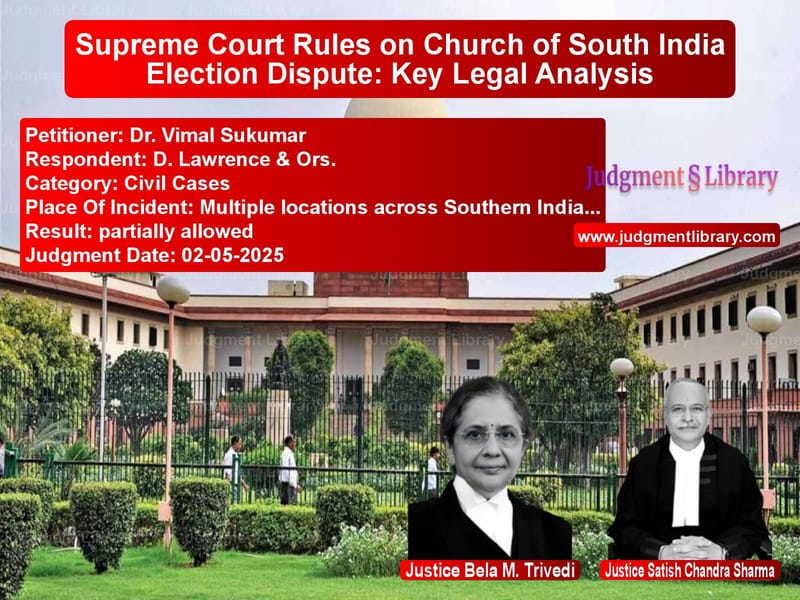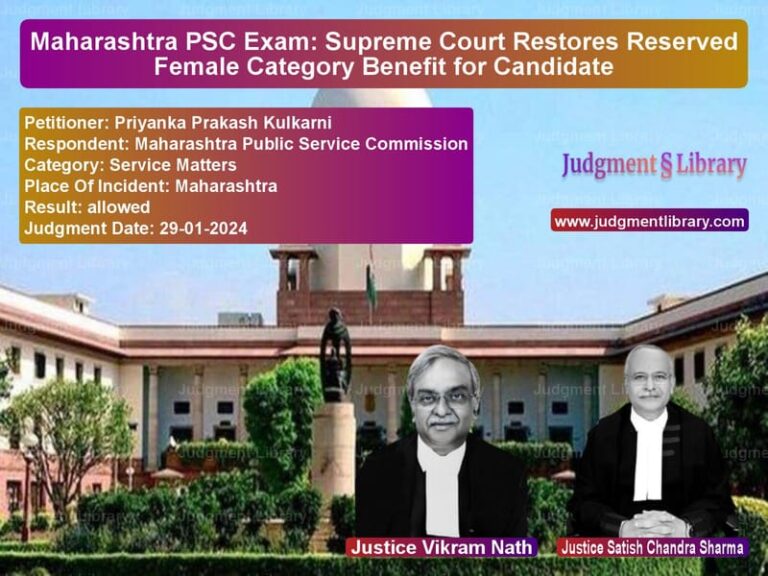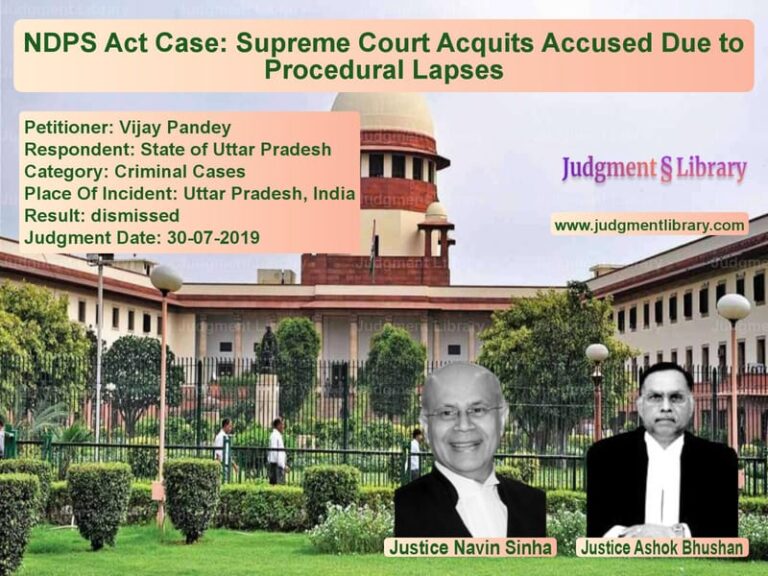Supreme Court Rules on Church of South India Election Dispute: Key Legal Analysis
In a landmark judgment that brings clarity to the complex legal battle surrounding the Church of South India’s internal elections and constitutional amendments, the Supreme Court of India delivered a comprehensive ruling on May 2, 2025. The case, which involved multiple appeals stemming from various civil suits filed in the Madras High Court, centered around the validity of elections for key office bearers and amendments to the CSI Constitution. The dispute had created significant turmoil within the 4.5 million-member religious organization, with allegations of procedural irregularities, invalid constitutional amendments, and flawed electoral processes threatening the very governance structure of one of India’s largest Protestant denominations.
The legal journey began when several members of the Church of South India filed civil suits challenging various aspects of the organization’s administration. The primary contention revolved around the election of the Moderator—the highest position in the CSI hierarchy—and other office bearers, including the Deputy Moderator, General Secretary, and Treasurer. The plaintiffs alleged that the electoral college was fundamentally flawed and that constitutional amendments, particularly those increasing the retirement age of clergy from 67 to 70 years, had been improperly ratified.
The Factual Background
The Church of South India, established on September 27, 1947, represents Protestant churches across Southern India and Sri Lanka. As an unregistered body, it operates under a written Constitution that governs its ecclesiastical functions. The parallel organization, Church of South India Trust Association, handles secular functions and property administration as a company registered under Section 8 of the Companies Act, 2013.
The controversy began when Most Rev. Dharmaraj Rasalam was elected as Moderator on October 11, 2020, for a three-year term ending October 11, 2023. Plaintiffs raised concerns about his criminal antecedents, noting that nearly ten FIRs were pending against him at the time of his nomination. This led to the filing of the first suit, C.S. No. 86 of 2022, on January 3, 2022, seeking the framing of a scheme to establish qualifications and disqualifications for the post of Moderator.
Subsequent litigation involved challenges to a Special Meeting of the Synod held on March 7-8, 2022, where significant amendments to the CSI Constitution were approved, including the contentious increase in retirement age for bishops and presbyters. Multiple suits were filed questioning the validity of these amendments and the elections conducted based on them.
Arguments Presented by the Appellants
The appellants, representing the CSI administration, presented extensive arguments defending the validity of the Synod meeting and subsequent amendments. Regarding the Special Meeting of March 7, 2022, they argued that “the learned Single Judge had the benefit of viewing the video in this case and there was not a whisper from anybody that there was no resolution convening the meeting and in fact the plaintiff in C.S. No. 45 of 2022 also did not raise any objection as seen in the videography.”
On the issue of ratification of constitutional amendments, the appellants presented detailed statistical arguments: “out of 359 members, 326 members were present at the Special Synod Meeting held on 07.03.2022. With regards to the amendment proposing the increase of clergy retirement age from 67 to 70 is concerned, 289 members voted for the proposal for an increase in the retirement age and 37 voted against it.” They further contended that the requirement of 2/3 majority ratification by diocesan councils had been met, arguing that “if the votes of the Coimbatore, Nandyal and Medak are counted as ratifications and the vote of Karnataka Central diocese removed from consideration all together, it is seen that 15/21 diocese ratified the amendment and this comfortably crosses the 2/3 majority.”
The appellants also challenged the Division Bench’s findings regarding the electoral college, arguing that “the margin of victory for the 3 office bearers explicitly conveys the will of the majority non disputed electoral college/voters. The learned Division Bench unfortunately did not abide by the spirit of election and democracy, instead interdicted the same at the instance of a few individuals.”
Arguments Presented by the Respondents
The respondents, representing the plaintiffs challenging the elections and amendments, presented counter-arguments emphasizing procedural irregularities. They contended that “the statement that the impugned orders virtually decides C.S. No. 86/2022 is false. The relief prayed for in C.S. No. 86/2022 is for framing of a scheme for the administration of CSI. There is no scheme framed in the Impugned Orders. In fact the Appellant’s actions in attempting to amend the CSI Constitution pending a Scheme Suit was a blatant attempt to frustrate the suit.”
Regarding the scope of relief, the respondents argued that “the powers of the Court is not limited by the specific allegations contained in the plaint and can consider subsequent events that affect the proper administration of CSI.” They emphasized the representative nature of the litigation, noting that “the appointment of the administrators only serves to protect CSI and the larger interest of the CSI membership which is more important than protecting the selfish motives of the Appellant who is only 1 out of 45 lakh CSI members.”
The Supreme Court’s Analysis and Ruling
The Supreme Court, after extensive examination of the records and arguments, delivered a nuanced judgment that partially upheld and partially set aside the decisions of the lower courts. The bench comprising Justices Bela M. Trivedi and Satish Chandra Sharma addressed six key issues in their analysis.
On the validity of the Synod meeting convened on March 7, 2022, the Court held: “We are of the considered opinion that the Special Meeting of the Synod on 07.03.2022 was duly convened. By going through the minutes of the Special Executive Committee of the Synod meeting held on 12.01.2022, it can be observed that: (a) Executive Committee of the Synod decided to send a resolution for the proposed constitutional and bye-law amendments to the Synod for the consideration and approval at its Special Session; (b) Executive Committee of the Synod decided to summon a special meeting of the Synod for the aforesaid purposes and to authorise the Moderator and other Officers of the Synod to fix the time and place of the meeting in consultation with the Bishops.”
However, regarding the ratification of constitutional amendments, the Court found procedural infirmities: “We are unable to concur with the submission advanced by the learned counsel for the appellants, which effectively presumes or infers ratification of the proposed constitutional amendments by certain Diocesan Councils, based on statistical voting patterns or lack of objection from absentee members. Such an approach cannot substitute the mandatory procedural compliance explicitly required under the Constitution of CSI.” The Court specifically noted that “any deviation from these procedural norms—such as convening meetings with inadequate notice (as in the case of Coimbatore), or relying on partial approval of select amendments (as in the case of Nandyal), or presuming the intent of silent or abstaining members—undermines the sanctity and legitimacy of the ratification process.”
On the crucial issue of the Moderator’s election, the Court upheld the Single Judge’s finding of invalidity: “Accordingly, the core issue for consideration for the post of Moderator is that the nominated Bishop ‘should not be due to retire during the ensuing term.’ Since the Synod meets every three years (Rule 20), it can be concluded that ‘ensuing term’ refers to the next three-year period. Therefore, the nominated Bishop must have at least three years remaining before their mandatory retirement at the time of nomination. In the present case, since the incumbent Moderator completed the age of 67 years in May 2023 and elections were held on 11.10.2020 for the three years period ending on 11.10.2023, it cannot be said that it was a fair nomination and hence, lacks legitimacy and integrity in the election process.”
However, the Court set aside the Division Bench’s finding regarding the electoral college for other office bearers: “The learned Division Bench found that the electoral college was flawed based on the grounds that some of the diocesan councils do not comply with the requirements of the CSI Constitution regarding the nominated members i.e. bye laws states that number of members who should be below the age of 35 years and the number of women members. However, these factual assertions do not bear the direct impact on the core issues in the present applications, which pertains to the validity and effect of the amendments in question on the electoral process.”
The Court emphasized that “the focus for consideration is not on the individual composition of the diocesan council per se, but rather on whether the amendments impacted the legitimacy of the election as a whole. Therefore, the learned Division Bench has declared the electoral college flawed without establishing the causal link to the amendments in question.”
On the appointment of Administrators, the Court sustained the Single Judge’s approach: “Since the election of the Moderator is declared as invalid and it is not in the interest of 4.5 million members of the CSI that the institution functions without a Moderator until the final disposal of the suit. Moreover, the records indicate that the office bearers rushed the amendment process, despite the bye-law allowing two years for ratification by diocesan councils. This suggests they aimed to pass the amendments before the 2023–2026 elections.”
Regarding the procedural requirement of Order 1 Rule 8 of CPC, the Court clarified: “Order 1 Rule 8 CPC does not prescribe any stage at which the application can be filed. While it is not a mandatory pre-condition for the institution of a suit or for the granting of interim relief, it is a procedural requirement that cannot be disregarded altogether which bears upon the binding nature of any orders issued.”
Conclusion and Implications
The Supreme Court’s judgment represents a careful balancing of procedural compliance with practical governance needs. By invalidating the Moderator’s election while upholding the elections of other office bearers, the Court acknowledged both the procedural irregularities in the amendment process and the need for institutional stability. The ruling emphasizes that religious organizations, while autonomous, must adhere to their own constitutional procedures when making significant changes to governance structures.
The Court specifically noted that “the observations contained in this order are only prima facie in nature and shall not be construed as a reflection on the merits of the aforementioned civil suits, which shall be decided independently at the stage of final adjudication.” This preserves the rights of all parties to fully litigate the underlying issues while providing immediate guidance for the CSI’s administration.
The judgment also reaffirms the principle that “the power to amend the CSI Constitution rests with the Synod, and nothing in this order should be interpreted as interference with that amending power.” This demonstrates the Court’s respect for religious autonomy while insisting on procedural regularity.
For the 4.5 million members of the Church of South India, this ruling provides a path forward—allowing for the fresh election of a Moderator while maintaining continuity through the continued service of other duly elected office bearers. The decision underscores the importance of following established procedures in religious governance while recognizing the practical realities of administering large religious organizations.
The Supreme Court’s nuanced approach in this case sets an important precedent for resolving internal disputes within religious organizations, balancing respect for religious autonomy with the requirement for procedural fairness and good governance. As the CSI moves forward with fresh elections for the position of Moderator, this judgment will serve as a guiding principle for ensuring that constitutional processes are followed scrupulously, preserving both the integrity of the organization and the trust of its millions of members.
Petitioner Name: Dr. Vimal Sukumar.Respondent Name: D. Lawrence & Ors..Judgment By: Justice Bela M. Trivedi, Justice Satish Chandra Sharma.Place Of Incident: Multiple locations across Southern India and Sri Lanka.Judgment Date: 02-05-2025.Result: partially allowed.
Don’t miss out on the full details! Download the complete judgment in PDF format below and gain valuable insights instantly!
Download Judgment: dr.-vimal-sukumar-vs-d.-lawrence-&-ors.-supreme-court-of-india-judgment-dated-02-05-2025.pdf
Directly Download Judgment: Directly download this Judgment
See all petitions in Property Disputes
See all petitions in Contract Disputes
See all petitions in Consumer Rights
See all petitions in Debt Recovery
See all petitions in Lease Agreements
See all petitions in Succession and Wills
See all petitions in Landlord-Tenant Disputes
See all petitions in Specific Performance
See all petitions in Damages and Compensation
See all petitions in Cheque Dishonour Cases
See all petitions in Environmental Cases
See all petitions in Education Related Cases
See all petitions in Reservation Cases
See all petitions in Judgment by Bela M. Trivedi
See all petitions in Judgment by Satish Chandra Sharma
See all petitions in partially allowed
See all petitions in supreme court of India judgments May 2025
See all petitions in 2025 judgments
See all posts in Civil Cases Category
See all allowed petitions in Civil Cases Category
See all Dismissed petitions in Civil Cases Category
See all partially allowed petitions in Civil Cases Category







